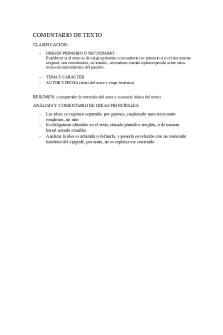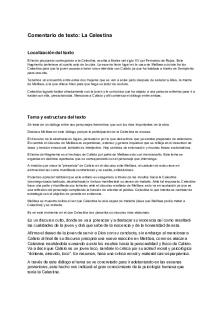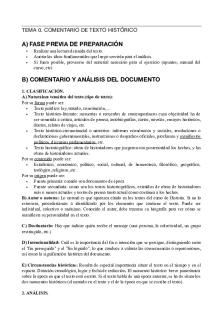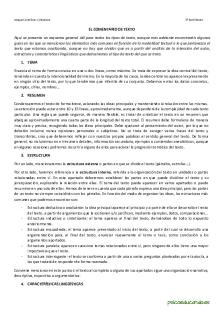Justice for Ireland - Comentario de texto PDF

| Title | Justice for Ireland - Comentario de texto |
|---|---|
| Author | Caroline Lévesque |
| Course | Mundos Anglófonos en Perspectiva Histórica y Cultural |
| Institution | UNED |
| Pages | 3 |
| File Size | 126.6 KB |
| File Type | |
| Total Downloads | 23 |
| Total Views | 124 |
Summary
ejemplo de comentario de texto...
Description
Mundo Anglófono en perspectiva Histórica y Cultural
Ireland for Justice Written by Daniel O’Connell Marie Caroline Lévesque Tremblay
2017/2018
Marie Caroline Lévesque Tremblay
Comentario de texto Justice for Ireland
Prueba de evaluación continúa Curso 2017/2018
Mundo Anglófono en perspectiva histórica y cultural
Justice for Ireland This text is a historical text which was written at the beginning of the 19th century when Ireland finally became part of the United Kingdom but got its parliament abolished. The only Irish that were able to take part in the British parliament were the member of the Catholic Church. This brought a great amount of votes for the Irish that were part de the parliament and took the Catholic Emancipation Act reform along. O’Connell was the one in charge of doing the first speech regarding this new reform defending the Irish in all of its parts. The author is primary as he puts us into his situation as a member of the Irish Catholic Church and member of the British parliament. He was born in Ireland in 1775 and died in 1847. He was called the Liberator of Ireland. The text was written in the 19th century once the Irish Catholic Members of the Church had some power in the British Parliament. The speaker makes a synthesis about the accomplishments of the Irish and British in the previous years, with all of his resentment for the repression lived by the British over so many years. The people who it is written for are individual interested in a specific moment of the history of Ireland, Britain and the United Kingdom, especially referring to the introduction of the Catholics in Britain in that period. The circumstances that the text refers to are a very complicated moment in the Irish history as their parliament was abolish, they were still fighting for their rights and they were trying to have their religion recognized in Britain which was a frequent cause of war in that era. In 1800 Ireland became part of the United Kingdom but it wasn’t until 1828 that the Irish were well voted in the parliament, so they would be taken under consideration by the British impressed Prime Minister from the results of the votes. The Catholic Emancipation Act was finally approved in 1829 by the British Parliament. The text is a speech done by Daniel O’Connell in 1836. According to its beginning “It appears to me impossible to suppose that the House will consider me presumptuous in wishing to be heard…” It remind us that the Irish didn’t have much voice in the parliament in that era and were
Marie Caroline Lévesque Tremblay
Comentario de texto Justice for Ireland
Prueba de evaluación continúa Curso 2017/2018
Mundo Anglófono en perspectiva histórica y cultural not used to be listened to by the British. There were men that still were not willing to give justice to Ireland, which makes the intervention even more complicated for the opponent. The text says that England never did justice to Ireland because they had to make many concessions to be part of the United Kingdom, especially when speaking of religion. But on the other hand the text specifies that the speaker is wearing the dwelt in the moment of the speech, which brought some groans, but also shows that he was a brave man and fighting for his beliefs. It is mentioned that the king usually says as less as possible in his speeches but still approves the suppression of the public liberty and the checking of the public discussion as well as individual reprobation. It is well known that Britain always had a good relationship with the kingdom and government of France and it mentions the collaboration that both countries had, which according to the speaker would bring the public liberty of Europe. Daniel O’Connell is getting older but he still believes in the same truth as when he was younger and he is ready to serve his country. He specifies that he doesn’t want any money; he just wants justice for his Ireland. He strongly believes that soon or later justice will be made and is not afraid of being laughed at for that. The main idea of the text is to show that there was a will of union in the 19th century between Britain and Ireland even if the Irish didn’t feel that justice was yet made. The catholic started to be recognised by the British parliament. I interpret that the text wants to show us the Irish feeling in that period, even if there was an approach between the British and the Irish, the British still thought they could have the power on everything and the Irish felt that justice wasn’t made. The intention of the author is to make us see the Irish side of the history. According to it, in that era there were several Acts that got firm in the British parliament which gives veracity to the text. This speech was very important in the introduction of the Irish in the British parliament and the beginnings of being part of the United Kingdom. Historically, it was a new beginning for the Irish. I think that the Catholic Emancipation Act was a good start for the Irish, but the wounds weren’t cured yet and it’s what made the Irish not fully into the United Kingdom, as least in their hearts and soul....
Similar Free PDFs

Modelo Comentario DE Texto
- 1 Pages

Comentario de texto Celestina
- 3 Pages

Comentario de texto MARX
- 4 Pages

Comentario de texto Runas
- 3 Pages

Esquema comentario de texto
- 3 Pages

Herodoto comentario de texto
- 9 Pages

Comentario de texto
- 7 Pages

Dewey, comentario de texto
- 7 Pages

-EL Comentario DE Texto
- 3 Pages

Comentario de texto latín
- 4 Pages

Lengua Comentario de texto
- 2 Pages

Comentario de texto resuelto
- 3 Pages

Comentario DE Texto Historico
- 4 Pages

Comentario de texto
- 2 Pages
Popular Institutions
- Tinajero National High School - Annex
- Politeknik Caltex Riau
- Yokohama City University
- SGT University
- University of Al-Qadisiyah
- Divine Word College of Vigan
- Techniek College Rotterdam
- Universidade de Santiago
- Universiti Teknologi MARA Cawangan Johor Kampus Pasir Gudang
- Poltekkes Kemenkes Yogyakarta
- Baguio City National High School
- Colegio san marcos
- preparatoria uno
- Centro de Bachillerato Tecnológico Industrial y de Servicios No. 107
- Dalian Maritime University
- Quang Trung Secondary School
- Colegio Tecnológico en Informática
- Corporación Regional de Educación Superior
- Grupo CEDVA
- Dar Al Uloom University
- Centro de Estudios Preuniversitarios de la Universidad Nacional de Ingeniería
- 上智大学
- Aakash International School, Nuna Majara
- San Felipe Neri Catholic School
- Kang Chiao International School - New Taipei City
- Misamis Occidental National High School
- Institución Educativa Escuela Normal Juan Ladrilleros
- Kolehiyo ng Pantukan
- Batanes State College
- Instituto Continental
- Sekolah Menengah Kejuruan Kesehatan Kaltara (Tarakan)
- Colegio de La Inmaculada Concepcion - Cebu

